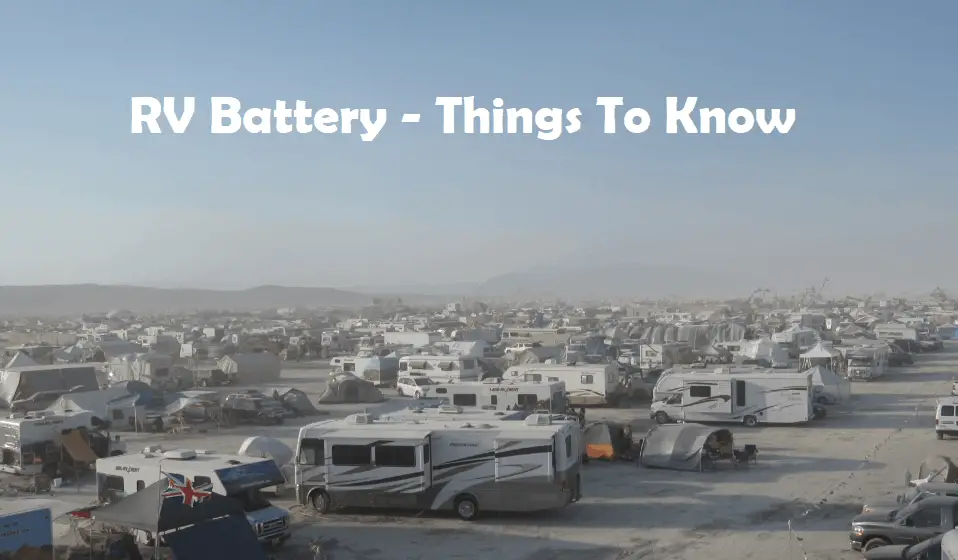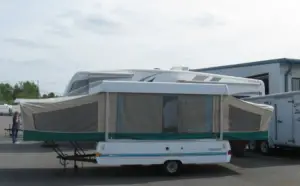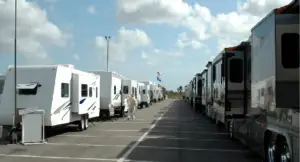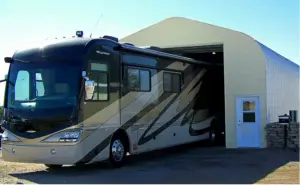RV appliances need electricity and because you may not have electric hookup all the time, other sources of energy are inevitable. RV appliances are designed to support energy sources like propane, solar panel output and also DC battery.
If you have a smaller travel trailer or a pop up camper then you exactly know the importance of a good battery. Going boondocking means you don’t have the electric hookup and that’s when the DC battery or even propane as source of fuel or supply comes into picture.
As an Rver batteries are critical for you. Lets go through various aspects of RV battery that you need to know.
1. What can RV battery power
RV’s are designed and have appliances that will run on AC power, but they can also be run using the battery DC power. While the Ac power is the best option, you can use DC batteries to supplement during boon docking or while on road.
You can run below appliances but it depends on the amount of charge the batteries hold. As, the battery power consumption may be high in some cases like air conditioners.
Remember, the Rv batteries can run smaller appliance but using them for bigger appliances will drain them quickly. And thus, it may not be practical to use them to power bigger appliances like air conditioner or microwave.
You can run below on RV battery,
- RV lights
- Fan
- Water Pump
- Starting RV engine
- Air conditioner
- Refrigerator
- Heating appliances
- Microwave
- Computer
- Television
- Radio
In most cases above you can use an inverter to convert the DC battery power into AC power. So, you may need to have inverter as well. Generator can also be used to give direct AC power.
2. What are the RV battery types
A RV battery type you need depends on the usage you have or rving style you prefer. Depending on the usage, you can install the RV battery. The RV’s need house batteries to run different appliances that i listed above.
A mototorhome would also need a battery to start the engine. Normally to run appliances you need larger CCA (cold cranking amp) batteries.
Deep cycle batteries :
House batteries provide amps for a longer period of time which will be smaller in comparison to what’s needed for starting the engine. Thus, deep cycle batteries are suited for this which provides lower amps but over a longer period of time.
Marine batteries :
With lower CCA, the marine batteries are designed to give amps for lower period of time. They are designed to be cheaper as compared to deep cycle batteries.
This are suitable for those who do not have high usage. People who don’t boon dock often can opt for this. They are also less costly but don’t have high life. Their life is almost half as compared to deep cycle, but will also cost half.
The deep cycle batteries can be made using any of the below processes,
AGM : This are called as dry batteries as they don’t need water. Absorbed glass matting, their electrolyte is soaked in fiberglass. They can last longer as compared to gel.
Gel : They are jelled electrolyte and do not need refiling of water. They are costly as compared to others.
Flooded cell : they are water based and need periodic water filling. Distilled water is needed for them.
Li-ion : They are more costly and need less maintenance. They are good on power and also less in weight
3. How many hours can they last
A fully charged RV deep cycle battery would last depending on how many appliances you run on it. A RV battery is rated in terms on amp-hours.
A standard RV deep cycle battery would be rated at around 100 amp hours. What this really means is your appliances can use either 1 amps for 100 hours or say 2 amps for 50 hours.
So, how many amps are your appliances going to draw? It depends on the appliance’s watts ratings. A light of say 60 watts would take around 1.8 amps. Similarly, all other appliances running on battery would take amps depending on the watts.
A refrigerator when running may not take much amps but an air conditioner or a microwave will drain the batteries by pulling amps that will be high.
Thus, if all of your devices or appliances take say around 5 amp then the 100 amp-hour battery would last for around 20 hours or so. If your usage is less than the battery can stay ON for weeks.
One another option is to connect multiple batteries in series connection and get more hours. But, weight of the RV battery is also a factor to concerned about. One can also have multiple batteries but use one at a time, this helps in planning if you have longer time to cover.
Remember, no two rvers will have same usage. It all depends on how many appliances are running. A minimal usage of lights and other smaller appliances can give you long hours. But, if you want to run devices that draw larges amps then be prepared to charge batteries more often.
4. Why does the RV battery not charge
A battery not charging even after connecting to the shore power is an issue many of us face. This could happen because of number of reasons.
The battery could be an older one and is no longer working. It could be because of wiring issue or because of the on-board charge not functioning. The other most common reason is the fuse of the charger system blown.
So, as first troubleshooting step check for loose wiring connection. If that seems okay, then check for fuse. This normally happens when the battery is not hooked up correctly and the fuse blows because of that.
If it was your first try to charge the batteries, then there is good chance that the converter is not the one that is designed for charging the house batteries.
One point while charging the batteries you need to keep in mind is never drain your batteries below 50%. At times that is okay but going below 20% is definitely not good to do. So, stay charged above 20% or better above 50%. Undercharging is one of the prime reasons why batteries fail earlier than expected.
5. Do RV battery freez
Winter can be harsh on your RV and its components. A RV battery is no different. A freezing temperature can destroy the RV battery if its not properly stored and is not charged fully. A discharged battery may freeze at the lesser temperature at which water freezes.
What about fully charged batteries? Well, even the fully charged batteries can freez if the temperature are extremely low like -75 Fahrenheit or so.
One point for normal weather during winter is to keep the batteries properly stored. Like keeping them concrete can be bad, make sure they are stored warm. Lower the temperature, higher is the risk of freezing of electrolyte. With freezing, the electrolyte expands and results in damage.
During winter when the RV is stored, the batteries will start to self discharge. The discharge could be as high as 5% per month. And, in worse condition like storing the batteries on concrete base could result in further decrease.
Li-ion or gel batteries have lower self discharge rate. Also, the self discharge can be higher in case of not fully batteries. So, moral of the story, make sure your batteries are fully charged before going into storage.
6. Using the RV battery for car
RV’s use deep cycle or marine batteries which are designed to supply lower amps for a longer period of time. For car, you need batteries that supply high amps at the starting to kick start the engine.
Thus, not all RV batteries can be used for car. However, you do get different amps of RV batteries and thus, if you find one that is able to start the car then its fine to go with it.
With high amps needed at starting the car, deep cycle batteries would drain faster though. Check for CCA of the car and then decide if the deep cycle battery you have can fit the requirements or not.
But, the basic question. Why would you want to do it anyway? The car batteries are specially made and are best to supply the amp current needed for car.
And, deep cycle batteries used in RV as said above are for different purpose altogether. If you make this wrong usage then obviously it will have bad performance. And you definitely don’t want to get stuck with a car engine failing to start.
7. Storing RV battery in winter
Lets get to the points straight-away.
1. Store the batteries inside storage area or your garage. If its heated one with better warm temperature then very well. A battery may freeze with lower temperatures and thus make sure its warm where its stored.
2. Keeping the Battery inside your trailer or RV could be bad.
3. Make sure the battery isn’t kept on a direct concrete floor. It will make it cooler. Instead, use some shelf or some other base for storing.
4. When the batteries are kept idle they loose the charging. Hence, check their voltage during winter and charge them during the storage. You may want to do that 1 or 2 time during the three months. They loose around 5% per month when idle.
5. Before putting the batteries to storage make sure they are fully charged.
6. Can you keep the batteries connected to charger continuously? Its not a good idea, even with smart automatic charging there is risk of overcharging. So, better keep them unconnected and check once in while during the winter months
8. Testing a RV battery
One of the things in maintaining the RV batteries is to test them. Test for what? You need to check if the voltage rating is correct or not. After prolong use or after storage, the batteries may not remain as good.
And, as a precaution of identifying this, you do a voltage checking test. This can be done using a simple multi-meter.
You need to set the multi-meter on DC volts and then check the voltage reading for the battery. But, wait! Follow below procedure to take the reading.
Remove the batteries from the trailer or RV and store it for some hours. Then, once you are ready to take the reading, make sure surface charge is gone.
For this, you could connect the battery and run some smaller appliance or RV lights. After you are done with this, connect the positive terminal of multi-meter to positive lead and negative one to negative lead. This will show the voltage reading. A 12 V battery will show around 12.8 V and 6 V battery show around 6.4 V it could be little lower to around 12.6 and 6.2 for 6 V battery.
9. Reason why battery drains faster
Not a rare scenario where you charged the batteries not so long ago and again the batteries are down. A bad battery wont charge fully and thus it will drain much faster.
So, there is no real direct solution for this as the batteries are either old or have been through worst conditions like overcharging or undercharging or have gone through freezing.
What about batteries that new and in good conditions? Well, the obvious reason is some appliances are taking too much amps. Or you have too many smaller appliances that run together and collateral draw is higher.
A carbon detector or the PL detector can drain the batteries faster. You run an air conditioner, and the battery charge is gone. Running stereos, clocks, water pumps together can drain the batteries.
A fridge ideally wont take much battery power but together with all other smaller appliances it can result in battery getting drained.
A new battery, if not charged fully will result in its draining earlier obviously. So, make sure the batteries are fully charged before using.
10. Voltage and charge relation in RV battery
Understanding the state of charge of a RV battery is not difficult. But, its not that straight forward either. A 12 V battery when fully charged has a voltage of around 12.6- 12.8 volts. Okay, most of us get that. So, does that mean a fully discharged battery will have 0 V?
No!
That’s not true, a fully discharged battery will have a voltage of around 12 V. Yes, you read that right. A battery that is reading 12.4 V means it is drained 50%. that’s funny isn’t it. Well, that’s how with watts, voltage and amps.
At times putting on bigger loads like microwave can make fall of the voltage up below 11 V or so. And, you plug it to shore power or generator and it shoots up above 14 V.
So, the voltage rating isn’t an direct indication of how charged your RV batteries are. Well, you can test the voltage reading by unplugging the batteries and removing the surface charge.
Another method of testing batteries is by hydrometer method but its little difficult. A multi-meter test gives good reading if the said steps are properly followed.
11. When to replace RV battery
On an average a RV battery can last around 4-6 years depending on the usage and the care taken. A good brand new battery can fail quickly if its charged wrongly or stored openly during winter times. This post about RV battery average life explains it in detail.
Most common reason why RV batteries fail is because they are not charged fully before putting to use. Overcharging is also another cause of early failure.
A battery failure starts when it is not able to charge fully. This continues and a time when it cannot hold charge is often seen. Make sure you charge them often and do not allow it to drain below 50%.
Making sure the battery stay charged fully during winter times is also critical. You may want to check on it every 15 to 30 days so that is charged again. An idle kept battery losses charge on its own (self discharging) and it can be around 5% per month.
Some other things that you can do include insulating the batteries properly from other solvents and adhesives. When connecting batteries in series, make sure same brand batteries are used. Keeping the batteries stored in little warm garage could do better for them during high colds as well.
12. Overheating of RV battery
Heated batteries is not uncommon. Its one of those issues you would have definitely faced. At times, the batteries could also smell. A battery overheating could be because of any of the reasons below.
- Constant high drawing by the running appliances can heat the battery. You can check the voltage by using a multi-meter just to make sure the voltage isn’t too high
- Overcharging of batteries can result in heating as well.
- Water level in the battery could be low, thus the charging is causing the temperature to rise.
- There is internal short and that is causing the battery go hot. Normally, when the battery are supplying the current, they would get warm but not hot. When its a short, the battery wouldn’t accept the charge and result in loss as heat.
- The temperature sensor may have been malfunctioning which detects wrong degrees.
A hot battery at times can smell like a rotten egg. Or like an H2S gas, if you have studied chemistry you know what i mean.
13. Location of the RV battery
When you are new to RVing or have just bought a new motorhome its okay that you cannot locate that RV battery. A RV battery normally like a big thick box could be placed anywhere depending on the type of RV it is.
Mostly, the batteries are kept inside a RV battery bank that can keep multiple batteries. This provision is given so that you can connect the batteries in series, like connecting 2 batteries of 6 V to get the total 12 V.
Your RV battery could be in the exterior or interior compartment. It could also be at the entry-steps which can be retracted. Or even inside the engine compartment. It totally depends on the motorhome design and layout.
Connecting batteries in series can be helpful during boondocking. Another way is to have multiple batteries but running one at a time.
14. Cost of a new RV battery
While on an average a rv battery can last 4-6 years, chances are that you may end up replacing it earlier as well. All people do not use their batteries or appliances in similar manner and thus life of battery may vary.
Running the batteries in a manner that is not recommend will always shorten its life. So, if you are thinking of buying a new RV battery? Below are the average cost of new batteries.
On an average a new RV battery would cost you around $300 – $500 . This depends on the type of battery, brand and the voltage. A 6 V battery would cost you less. On an average a 6 V one would be costing you around $100 – $200.
So, how many batteries do you need anyway. Mostly you should be okay with one 12 V batterry. If you are boondocking very often then you can have multiple batteries connected in series or keep spare one ready.
Remember you can always recharge the batteries whenever you have shore connection available or generator is available.





